语法专题十五 状语从句
- 格式:doc
- 大小:44.00 KB
- 文档页数:4
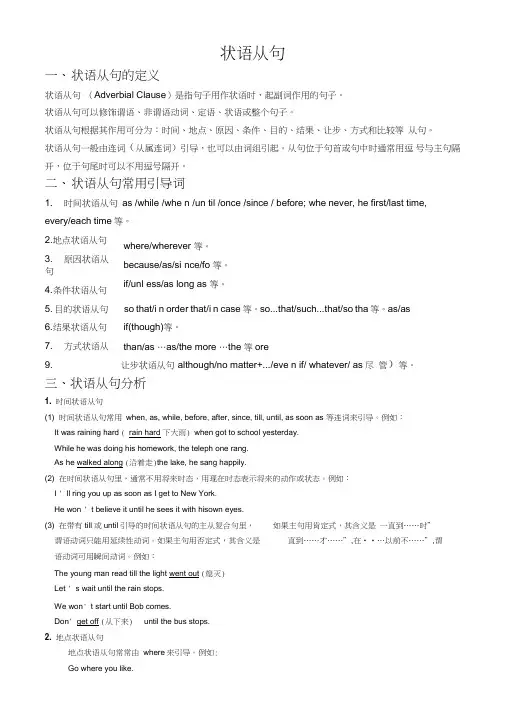
状语从句一、状语从句的定义状语从句(Adverbial Clause)是指句子用作状语时,起副词作用的句子。
状语从句可以修饰谓语、非谓语动词、定语、状语或整个句子。
状语从句根据其作用可分为:时间、地点、原因、条件、目的、结果、让步、方式和比较等从句。
状语从句一般由连词(从属连词)引导,也可以由词组引起。
从句位于句首或句中时通常用逗号与主句隔开,位于句尾时可以不用逗号隔开。
二、状语从句常用引导词1. 时间状语从句as /while /whe n /un til /once /since / before; whe never, he first/last time,every/each time等。
2. 地点状语从句3. 原因状语从句4. 条件状语从句5. 目的状语从句6. 结果状语从句7. 方式状语从句where/wherever 等。
because/as/si nce/fo 等。
if/unl ess/as long as 等。
so that/i n order that/i n case等。
so...that/such...that/so tha等。
as/as if(though)等。
than/as …as/the more …the 等ore9. 让步状语从句although/no matter+.../eve n if/ whatever/ as尽管)等。
三、状语从句分析1. 时间状语从句(1) 时间状语从句常用when, as, while, before, after, since, till, until, as soon as 等连词来引导。
例如:It was raining hard ( rain hard 下大雨) when got to school yesterday.While he was doing his homework, the teleph one rang.As he walked along (沿着走)the lake, he sang happily.(2) 在时间状语从句里,通常不用将来时态,用现在时态表示将来的动作或状态。
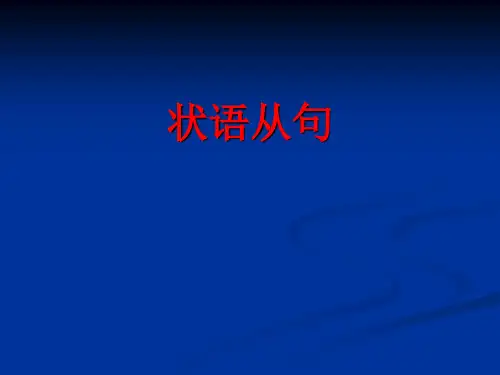
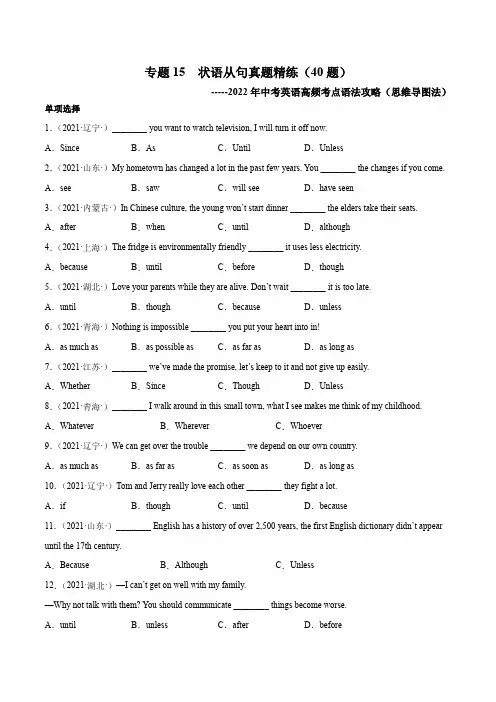
专题15 状语从句真题精练(40题)-----2022年中考英语高频考点语法攻略(思维导图法)单项选择1.(2021·辽宁·)________ you want to watch television, I will turn it off now.A.Since B.As C.Until D.Unless2.(2021·山东·)My hometown has changed a lot in the past few years. You ________ the changes if you come. A.see B.saw C.will see D.have seen3.(2021·内蒙古·)In Chinese culture, the young won’t start dinner ________ the elders take their seats. A.after B.when C.until D.although4.(2021·上海·)The fridge is environmentally friendly ________ it uses less electricity.A.because B.until C.before D.though5.(2021·湖北·)Love your parents while they are alive. Don’t wait ________ it is too late.A.until B.though C.because D.unless6.(2021·青海·)Nothing is impossible ________ you put your heart into in!A.as much as B.as possible as C.as far as D.as long as7.(2021·江苏·)________ we’ve made the promise, let’s keep to it and not give up easily.A.Whether B.Since C.Though D.Unless8.(2021·青海·)________ I walk around in this small town, what I see makes me think of my childhood. A.Whatever B.Wherever C.Whoever9.(2021·辽宁·)We can get over the trouble ________ we depend on our own country.A.as much as B.as far as C.as soon as D.as long as10.(2021·辽宁·)Tom and Jerry really love each other ________ they fight a lot.A.if B.though C.until D.because11.(2021·山东·)________ English has a history of over 2,500 years, the first English dictionary didn’t appear until the 17th century.A.Because B.Although C.Unless12.(2021·湖北·)—I can’t get on well with my family.—Why not talk with them? You should communicate ________ things become worse.A.until B.unless C.after D.before13.(2021·江苏·)Mary shut the window just now ________ she could keep the insects out.A.so that B.when C.till D.after14.(2021·内蒙古·)________ he is my favorite singer, I didn’t buy his new CD.A.If B.Ever since C.Even though D.Because15.(2021·黑龙江·)Your parents won’t let you go out alone ________ they are sure you’re safe.A.since B.if C.unless16.(2021·山东·)More and more children are interested in blind boxes ________ they wonder what is inside. A.so B.because C.unless D.though17.(2021·贵州·)Jason will go to visit his grandparents _________ he finishes his work this weekend. A.unless B.though C.if18.(2021·黑龙江·)The doctors were ________ busy ________ they had no time to rest.A.such; that B.so; that C.too; to19.(2021·黑龙江·)We’ll cause more pollution ________ we find ways to recycle more rubbish.A.unless B.if C.although20.(2021·湖北·)—I’m afraid I can’t do well in the sports meeting.—Don’t worry. I will support you, _________ you don’t succeed.A.even if B.if C.so that D.unless21.(2021·新疆·)We can achieve our dream ________ we don’t give up hope in the face of difficulties. A.even though B.as long as C.so that D.no matter what 22.(2021·湖北·)— How do you like the singing competition yesterday?— Exciting, ______ some students didn’t do very well.A.so B.and C.though D.because23.(2021·青海·)—Paul is badly hurt on the playground. Let’s help him up.—Don’t move him ________ you know some first-aid knowledge.A.unless B.if C.until24.(2021·山西·)Please don’t hurt the little animals ________ you see them on the street. They are our friends. A.so B.when C.unless25.(2021·江苏·)You need to practise speaking every day ________ you hope to improve your spoken English. A.if B.although C.unless D.until26.(2021·天津·)My cousin became a country doctor ________ he finished medical school.A.after B.so that C.but D.so27.(2021·四川·)— I’m afraid that we can’t ________ the math problem ________ the teacher helps us.— That’s true. It’s too difficult.A.work on; if B.work on; unless C.work out; if D.work out; unless 28.(2021·甘肃·)________ you practice every day, you won’t make any progress.A.Although B.Unless C.If D.Since29.(2021·云南·)________ he heard the little girl crying for help outside, he rushed out of the room.A.As soon as B.Unless C.If D.Although30.(2021·浙江·)At the meeting, the managers kept arguing about the problem ________ they reached an agreement.A.after B.when C.until D.since31.(2021·重庆·)We were lucky yesterday. The bus left ________ we got on it.A.before B.although C.until D.as soon as32.(2021·重庆·)We should take the rest of the food home ________ we can’t finish what we order.A.if B.so C.unless D.until33.(2021·四川·)Our headmaster asks us to watch news every day ________ we can find out what’s going on around the world.A.so that B.even though C.in order to D.instead of34.(2020·辽宁·)I was late __________ I planned to get home early.A.although B.since C.if D.because35.(2020·四川·)Judy Brown ______ as an English teacher in our school since five years ago.A.works B.will work C.worked D.has worked36.(2020·辽宁·)You mustn't drive a car ________ you get a driver's license.A.unless B.while C.since D.after37.(2020·辽宁·)Aunt Lucy put the plant near the window __________ it could get enough sunlight.A.as if B.even though C.as long as D.so that38.(2020·广西·)_____Zhong Nanshan is 84 years old, he still works hard to fight against COVID﹣19. A.Because B.Though C.But D.And39.(2020·西藏·)You must make sure your mask (口罩) is clean ________ you put it on. A.before B.after C.since D.where 40.(2020·辽宁·)Cooking is an interesting lesson and we can make different dishes ________ we like. A.if B.after C.though D.so参考答案1.D【详解】句意:如果你不看电视,我现在就关了。
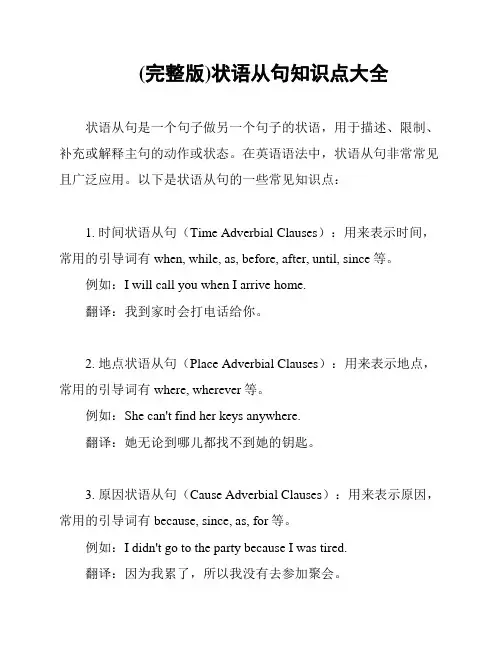
(完整版)状语从句知识点大全状语从句是一个句子做另一个句子的状语,用于描述、限制、补充或解释主句的动作或状态。
在英语语法中,状语从句非常常见且广泛应用。
以下是状语从句的一些常见知识点:1. 时间状语从句(Time Adverbial Clauses):用来表示时间,常用的引导词有when, while, as, before, after, until, since等。
例如:I will call you when I arrive home.翻译:我到家时会打电话给你。
2. 地点状语从句(Place Adverbial Clauses):用来表示地点,常用的引导词有where, wherever等。
例如:She can't find her keys anywhere.翻译:她无论到哪儿都找不到她的钥匙。
3. 原因状语从句(Cause Adverbial Clauses):用来表示原因,常用的引导词有because, since, as, for等。
例如:I didn't go to the party because I was tired.翻译:因为我累了,所以我没有去参加聚会。
4. 结果状语从句(Result Adverbial Clauses):用来表示结果,常用的引导词有so, therefore, thus等。
例如:He studied hard, so he passed the exam.翻译:他努力研究,所以他通过了考试。
5. 条件状语从句(Condition Adverbial Clauses):用来表示条件,常用的引导词有if, unless, provided that等。
例如:If it rains tomorrow, we won't go to the park.翻译:如果明天下雨,我们不会去公园。
6. 目的状语从句(Purpose Adverbial Clauses):用来表示目的,常用的引导词有so that, in order that等。

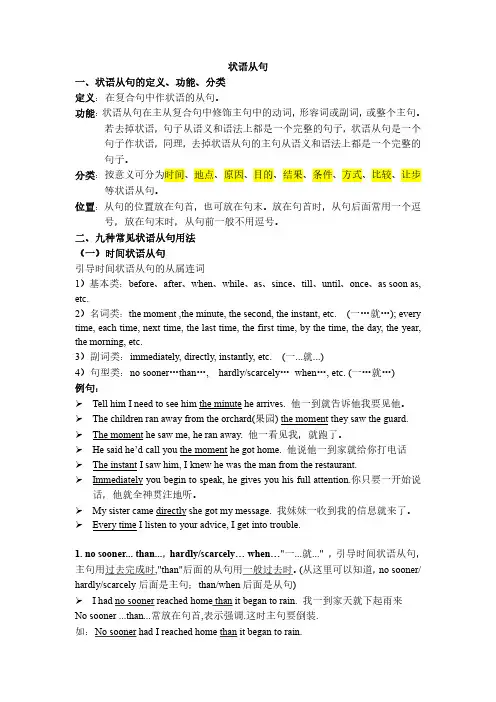
状语从句一、状语从句的定义、功能、分类定义:在复合句中作状语的从句。
功能:状语从句在主从复合句中修饰主句中的动词,形容词或副词,或整个主句。
若去掉状语,句子从语义和语法上都是一个完整的句子,状语从句是一个句子作状语,同理,去掉状语从句的主句从语义和语法上都是一个完整的句子。
分类:按意义可分为时间、地点、原因、目的、结果、条件、方式、比较、让步等状语从句。
位置:从句的位置放在句首,也可放在句末。
放在句首时,从句后面常用一个逗号,放在句末时,从句前一般不用逗号。
二、九种常见状语从句用法(一)时间状语从句引导时间状语从句的从属连词1)基本类:before、after、when、while、as、since、till、until、once、as soon as, etc.2)名词类:the moment ,the minute, the second, the instant, etc. (一…就…); every time, each time, next time, the last time, the first time, by the time, the day, the year, the morning, etc.3)副词类:immediately, directly, instantly, etc. (一...就...)4)句型类:no sooner…than…, hardly/scarcely…when…, etc. (一…就…)例句:Tell him I need to see him the minute he arrives. 他一到就告诉他我要见他。
The children ran away from the orchard(果园) the moment they saw the guard.The moment he saw me, he ran away. 他一看见我,就跑了。
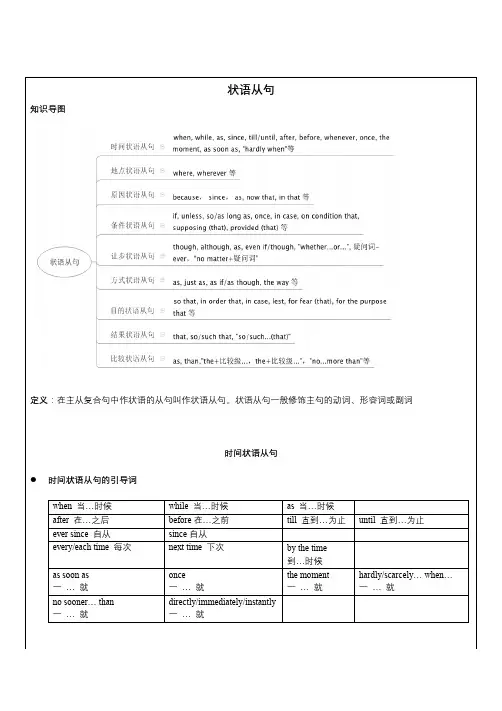
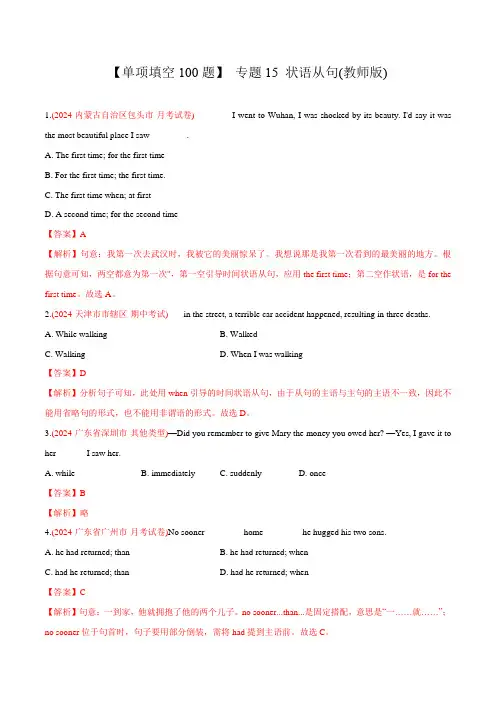
【单项填空100题】专题15 状语从句(教师版)1.(2024·内蒙古自治区包头市·月考试卷)________ I went to Wuhan, I was shocked by its beauty. I'd say it was the most beautiful place I saw ________.A. The first time; for the first timeB. For the first time; the first time.C. The first time when; at firstD. A second time; for the second time【答案】A【解析】句意:我第一次去武汉时,我被它的美丽惊呆了。
我想说那是我第一次看到的最美丽的地方。
根据句意可知,两空都意为第一次",第一空引导时间状语从句,应用the first time;第二空作状语,是for the first time。
故选A。
2.(2024·天津市市辖区·期中考试)___ in the street, a terrible car accident happened, resulting in three deaths.A. While walkingB. WalkedC. WalkingD. When I was walking【答案】D【解析】分析句子可知,此处用when引导的时间状语从句,由于从句的主语与主句的主语不一致,因此不能用省略句的形式,也不能用非谓语的形式。
故选D。
3.(2024·广东省深圳市·其他类型)—Did you remember to give Mary the money you owed her? —Yes, I gave it to her ______ I saw her.A. whileB. immediatelyC. suddenlyD. once【答案】B【解析】略4.(2024·广东省广州市·月考试卷)No sooner ________ home ________ he hugged his two sons.A. he had returned; thanB. he had returned; whenC. had he returned; thanD. had he returned; when【答案】C【解析】句意:一到家,他就拥抱了他的两个儿子。


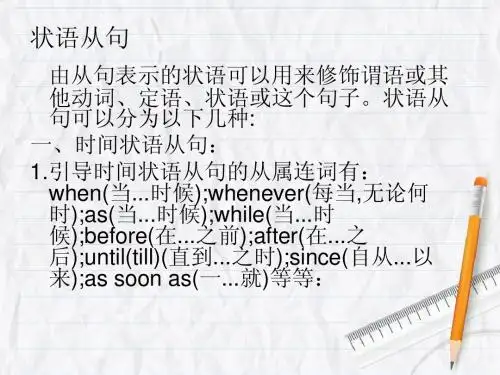
初中英语语法学习之状语从句精讲英语状语从句是英语学习中的一个重要考点,下面将针对英语状语从句进行考点归纳。
一、时间状语从句时间状语从句是语法中的一个重要考点,下面是一些常见的时间状语从句:when:表示某个时间点或时间段,如“I will arrive at the airport when the plane takes off.”before:表示某个时间点或时间段之前,如“I will eat breakfast before I go to work.”after:表示某个时间点或时间段之后,如“I will finish my homework after I have dinner.”while:表示某个时间点或时间段持续,如“I was studying while she was sleeping.”as soon as:表示某个时间点或时间段一过去就发生,如“I will call you as soon as I get home.”until:表示某个时间点或时间段一直持续,如“I won't leave until I have finished my work.”since:表示某个时间点或时间段以来,如“I have been living in this city since I moved here last year.”when/while/as:这些词都可以引导时间状语从句,但它们的使用略有不同,需要根据具体语境选择使用哪个。
需要注意的是,如果主句是一般将来时,从句只能用一般现在时,如“I will go to the store tomorrow”中的“tomorrow”就是时间状语从句。
二、地点状语从句地点状语从句是语法中的一个重要考点,下面是一些常见的地点状语从句: where:表示某个地点,如“I will go to the store where I bought the groceries.”that:表示某个地点或位置,如“I saw a beautiful sunset over that mountain.”which:表示某个地点或位置,如“The building which is on fire needs to be evacuated immediately.”where/that/which:这些词都可以引导地点状语从句,但它们的使用略有不同,需要根据具体语境选择使用哪个。
状语从句(adverbial clause)复习要点:掌握句法功能,记住连接词语法意义:状语从句是复合句中的一种,整个从句作主句的状语,修饰主句中的谓语动词、形容词、或副词。
置于句首时,状语从句后面一般要有逗号隔开;如果状语从句置于句尾,则从句一般不用逗号。
按照所作的状语和意义可分为时间、地点、原因、目的、结果、条件、让步、方式和比较等九种状语从句。
具体如下:一、时间状语从句(Adverbial Clauses of Time)时间状语从句通常由when,whenever,as,while,before,after,assoon as,since,once,no sooner...then,hardly/scarcely...when,tiLl/until 以及the moment,directly,immediately,the second,thefirst time,next time,every time,等引导。
1.由when,as,while 引导的状语从句:1)when 引导时间状语从句,表示当···,其谓语动词可以是延续性的,也可以是非延续性的,其作用最广泛。
When spring comes,trees turn green,When it rains,I usually go to work by taxi.When we were having lunch,the light went out.I will ring you up when I return.When she pressed the button,the lift stopped.He was eating his breakfast when the doorbell rang.be about to do...when...“就在那/这时,(突然)另一个动作发生了,在这儿只能用when。
状语从句英语语法知识点汇总状语从句 (Adverbial Clause) 是指句子用作状语时,起副词作用的句子。
状语从句中的从句可以修饰谓语、非谓语动词、定语、状语或整个句子。
下面就是小编给大家带来的状语从句英语语法知识点汇总,希望大家喜欢!地点状语从句通常由where, wherever 引导。
Where I live there are plenty of trees.我住的地方树很多。
Wherever I am I will be thinking of you.不管我在哪里我都会想到你。
方式状语从句通常由 as, (just) as…so…, as if, as though 引导。
1) as, (just) as…so…引导的方式状语从句通常位于主句后,但在(just) as…so…结构中位于句首,这时as 从句带有比喻的含义,意思是"正如…"," 就像",多用于正式文体,例如:Always do to the others as you would be done by.你希望人家怎样待你,你就要怎样待人。
As water is to fish, so air is to man.我们离不开空气,犹如鱼儿离不开水。
Just as we sweep our rooms, so we should sweep backward ideasfrom our minds.正如打扫房屋一样,我们也要扫除我们头脑中落后的东西。
2) as if, as though两者的意义和用法相同,引出的状语从句谓语多用虚拟语气,表示与事实相反,有时也用陈述语气,表示所说情况是事实或实现的可能性较大。
汉译常作"仿佛……似的","好像……似的",例如:They completely ignore these facts as if (as though) they never existed.他们完全忽略了这些事实,就仿佛它不存在似的。
状语从句考点聚焦和精讲用来修饰主句中的动词,副词,形容词或整个句子的从句叫状语从句。
根据其含义状语从句可分为时间状语从句,条件状语从句,原因状语从句,结果状语从句,比较状语从句,目的状语从句,让步状语从句,地点状语从句,方式状语从句。
状语从句都由从属连词引导,与主句连接,放在句末时,一般不在前面加逗号。
1. 时间状语从句(1)时间状语从句表示时间,常用when;while;as;before;after;since;till/until;as soon as等连词来引导。
时间状语从句中的谓语动词不能用一般将来时,只能用一般现在时表示将来发生的动作或存在的状态。
①由when(在……的时候;当……的时候)引导的时间状语从句,可表示“时间点”或“时间段”,从句谓语可以是终止性动词,也可以是延续性动词。
when可以指主句谓语动词和从句谓语动词所表示的动作同时或先后发生。
1. I got home, he was having supper. 当我回到家的时候,他正在吃饭。
2. he reached home, he had a little rest. 回到家以后,他休息了一会儿。
3. she came into my room, I was just reading a book. 她走进我房间时,我正在看书。
①由while(当……的时候) 引导的时间状语从句,只可表示“时间段”,从句谓语只限于延续性动词。
while强调主句谓语动词表示的动作持续于while从句所指的整个时间内;1.Please listen to me carefully I read. 我读的时候请认真听。
2.I can listen to the radio I work. 我可以边听收音机边工作。
3. I was sleeping, my father came in. 我睡觉时,我的父亲进来了。
4.Father was cleaning the car I was playing computer games. 当我正在打电脑游戏时,爸爸在清洗汽车。
高考英语状语从句知识点知识点复习高考英语状语从句知识点复习状语从句是高考英语中的一个重要语法点,它在句子中起到修饰、补充说明的作用,使句子的表达更加丰富和准确。
接下来,让我们一起系统地复习一下高考英语中常见的状语从句类型及其用法。
一、时间状语从句时间状语从句表示时间关系,常见的引导词有:when(当时候)、while(在期间)、as(当时,一边一边)、before(在之前)、after (在之后)、since(自从)、until / till(直到)等。
1、 when 引导的时间状语从句表示“当时候”,从句中的动作可以与主句的动作同时发生,也可以先于主句的动作发生。
例如:When I was a child, I often played in the park (当我还是个孩子的时候,我经常在公园玩耍。
)when 还可以表示“突然”,常用于 be doing when 结构。
例如:I was walking along the street when it began to rain (我正在街上走着,突然下起雨来了。
)2、 while 引导的时间状语从句表示“在期间”,从句中的动作通常是持续性的,而主句的动作通常是短暂性的。
例如:While I was reading, my mother was cooking (我读书的时候,妈妈在做饭。
)3、 as 引导的时间状语从句表示“当时,一边一边”,强调主句和从句的动作同时发生。
例如:As she sang, she danced (她一边唱歌,一边跳舞。
)4、 before 和 after 引导的时间状语从句before 表示“在之前”,after 表示“在之后”。
例如:Please close the window before you leave the room (在你离开房间之前,请关上窗户。
)After he finished his homework, he went to bed (他做完作业后就去睡觉了。
状语从句The Examples of Adverbial Clauses状语从句一、时间状语从句when, while, as, whenever, till, until, after, before, since, once, every/each time, the day一...就...1.As soon as2.The moment/minute/second/instant3.Immediately/instantly/directly4.No sooner...than... hardly/scarcely...when...Than/when 后采用一般过去时,主句采用过去完成时,主倒从不倒。
(adv./prep.位于句首,部分倒装)1.when, while, aswhen用法最广,常可代替while和as, as引导的时间状语从句既可以是延续性动词,又可以是非延续性动词;而while所引导的时间状语从句谓语动词只能是延续性动词,并常与进行时态连用。
1). When I lived in the countryside, I used to carry some water for him.2). While my wife was reading the newspaper, I was watching TV.3). As we were going out, it began to snow.when一般强调特定时间,还可表示:1.就在这时/就在那时突然...2.还没...就...3.一...就...4). When spring came, he felt like a trip.5). We were about to to leave when he came in.6). I had hardly sat down when he stepped in.=Hardly had I sat down when he stepped in.While所引导的时间状语从句强调主句和从句的动作同时发生或相对应,也表示对比。
语法专题十五状语从句[考点解析]状语从句状语从句在句中作状语, 修饰句中的动词, 形容词或副词等. 由从属连词作关联词, 从属连词在从句中不充当句子成分.状语从句按其意义和作用可分为时间, 条件, 原因, 让步, 目的, 结果, 方式, 比较, 地点等类型.1.时间状语从句(1). 常用的连词有when, while, before, after, until(till), since, as soon as等(2). 时间状语从句中一般不用将来时, 若谈论将来的事情, 往往用一般现在时代替, 例如:I’ll go on with the work when I come back tomorrow.Tom was watching TV while his mother was cooking in the kitchen.As soon as he finishes the work, he will come to see me.You must finish your homework before you watch TV.He has learned English for 3 years since he came here in 1990I won’t have supper until my mother comes back.When my cousin came yesterday, I was playing table tennis.As he grew, he got more knowledge.While the teacher explained (解释)the text, the students listened carefully and took notes.(3). when和while都表示“当……的时候”, 但有区别.when强调“特定时间”, 例如:There was a loud knock at the door when he was just falling asleep.while表示的时间是一段, 而不是一点, 如:While he was having supper, he heard someone knock at the door.while有时还有对比的含义. 如:While I was reading, he was writing.2.原因状语从句常由because, since, as引导. because表示直接的原因, 着重点在从句, 用于回答why, 语气最强. since一般表示对方已知的, 无须加以说明的既成事实的理由, 全句中心在主句, 语气比because弱, 常译为“既然”; as表示十分明显的原因, 一般说明因果关系, 着重点在主句, 语气较弱. 常译为“由于”; for是个并列连词, 只能放在另一个并列分句后面, 表示一种推理或解释, 或用作附加说明, 而不是指理由或原因, 语气最入, 一般不放在句首, 常译成“因为”. 例如:We work hard at English because it is very important now.I can’t go to school because I am ill.Since you are ill, I’ll go alone,Since he is very busy, we had better leave him alone.As it is raining hard, we won’t go hiking.As the weather was fine, we decided to climb the mountain3.条件状语从句常由if(假如, 如果), no matter(不管)来引导, 例如:No matter what he says, I won’t believe him.No matter how hard it is , I will try my best.如果主句是一般将来时, 从句往往用一般现在时来表示将来. 例如:If you work hard, you will pass the exam.4.结果状语从句一般由so…that, such…that引导. 例如It’s such a heavy box that nobody can move it. =It’s so heavy a box that nobody can carry it.The old woman was so poor that she did not have enough money buy a pair of shoes for her son.5.目的状语从句往往由so that, in order that引导, 例如:They got up much earlier so that they could arrive there on time.He set off early in order that he might be in time6.比较状语从句常由as…as, than, not as/so…as等引导. 比较从句部分是省略句, 例如:I’m taller than he (is)Science is not as popular as English.7.方式状语从句常用as引导. 例如:When in Rome, do as the Romans do.入乡随俗.Do as I say.照我说的做.8.让步状语从句由though或although等引导, 但不能与but同时连用, 如:Although she was very weak, she worked as hard as everyone else.9.地点状语从句常用where, wherever引导. 如:Wherever you go, I will go with you.[高考示例]1. I don’t think I’ll need any money but I’ll bring some ____________.(NMET 2000)A.as lastB.in caseC.once againD.in time解析:答案为B。
句意为“带些钱以防万一”,只能选择in case。
引导的条件状语从句,后面省略了I should need it。
2. The WTO can’t live up to its name _________ it doesn’t include a country that is home to one fifth of mankind.(NMET 2000)A.as long asB.whileC.ifD.even though解析:答案为C。
本题考查状语从句的用法。
句意为“假如世贸组织不包括占世界人口五分之一的中国的话,那它就名不副实”。
as long as语气过于强烈,while和even though不符合句意。
3、Someone called me up in the middle of the night, but they hung up_________I could answer the phone.(NMET 2000)A.asB.sinceC.beforeD.until解析:答案为C。
题意为:半夜里有人打来电话,我没来得及就挂了。
but暗示在接话前就挂了。
4.You should try to get a good nigh t’s sleep much work you have to do.A. howeverB. no matterC. althoughD. whatever解析:答案为A。
此题考查连词用法,依据结构However +形/副+主语+谓语。
故选A。
5.He speaks English well indeed, but of course not a native speaker.A. as fluent asB. more fluent thanC. so fluently asD. much fluently than解析:答案为C。
此题考查So adj./adv. As和as adj. / adv. As 用法,前者主要用于否定句,在这里要修饰谓语动词,故选C。
[触类旁通]1. ---May I have your name?---My name is Robert, ______most of my friends call me Bob for short.A. thenB. insteadC. howeverD. but2. ______much money his father gave him, Bruce was not satisfied with it and always asked for more.A. HowB. WhateverC. HoweverD. No matter3. ______ is mentioned above, it won’t be long before you regret what you have done.A. WhichB. AsC. ThatD. It4. The Chinese are good at playing table tennis ______the English are interested in football.A. ifB. asC. whileD. since5. In a sports team each player has a clear role, and there few occasions ______members are confused or uncertain of their roles.A. whenB. whereC. whichD. what6. Your skirt is really splendid, but ______ we actually need is not a skirt but a new pair of shoes.A. thatB. whatC. whetherD. how7. I don’t know the reason ______you were absent from the meeting, but I’m sure that someone will tell me the reason ______you haven’t told me.A. why; thatB. that; whyC. because; whichD. of which; that8. ---Can you tell me ______?---She is Catherine’s friend from New York.A. whom is the womanB. who is that womanC. that woman is whoD. who the woman is9. His friends could not understand why she should give herself so much trouble ______ she hadso many children to feed.A. ifB. soC. becauseD. when10. Frances must have been asleep at that time last night when her mother came home, ______?A. didn’t sheB. wasn’t sheC. hasn’t sheD. mustn’t she11. Your article must be sent by e-mail ______it can meet the deadline.A. or elseB. so thatC. in caseD. until12. The fire was finally brought under control, but not ______heavy damage had been caused.A. beforeB. afterC. sinceD. as13. We should be able to do the job for you quickly, ______you give us all the necessary information.A. in case ofB. provided thatC. or elseD. as if答案: 1.D 2.C 3.B 4.C 5.A 6.B 7.A 8.D 9.D 10.B 11.B 12.A 12.B。